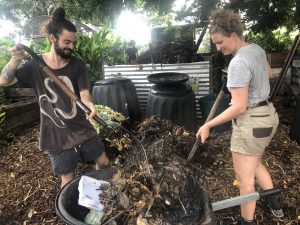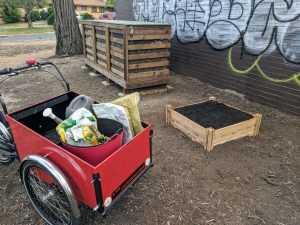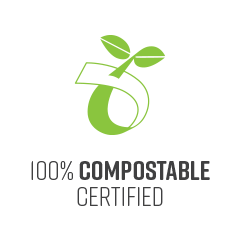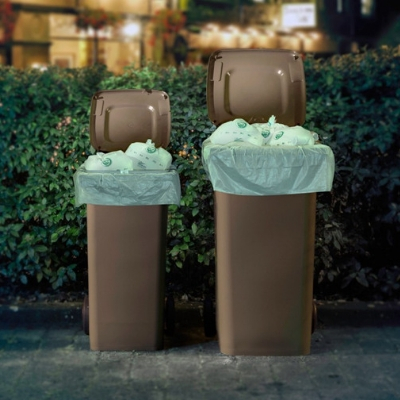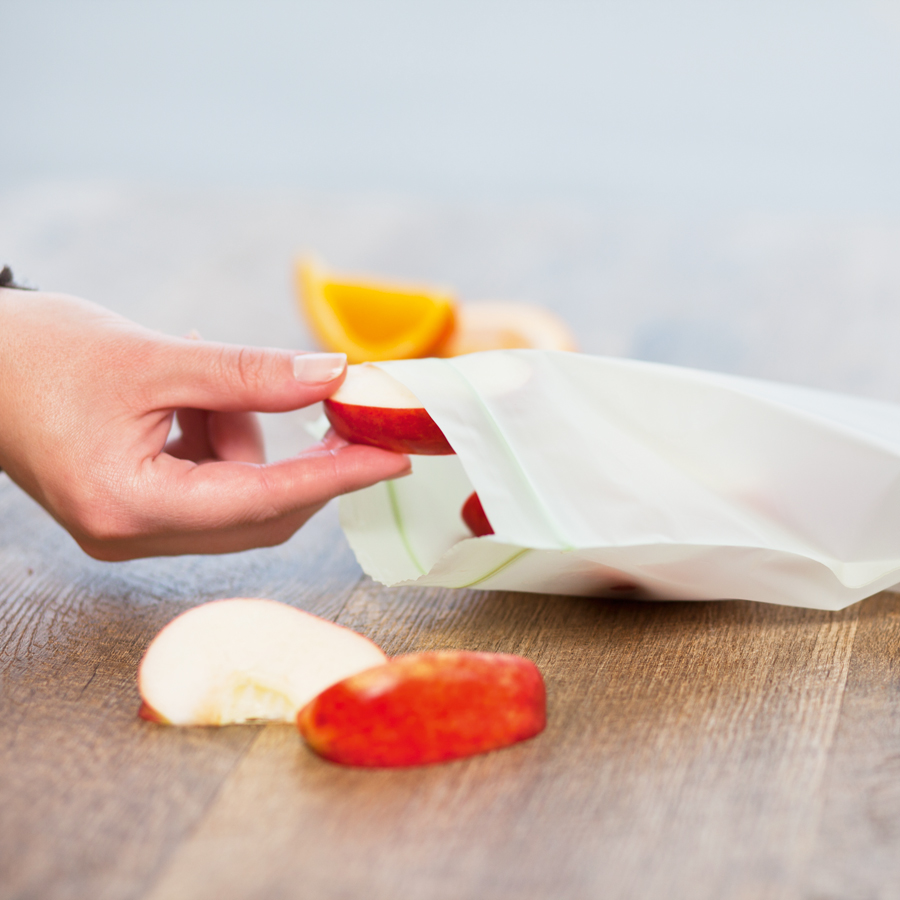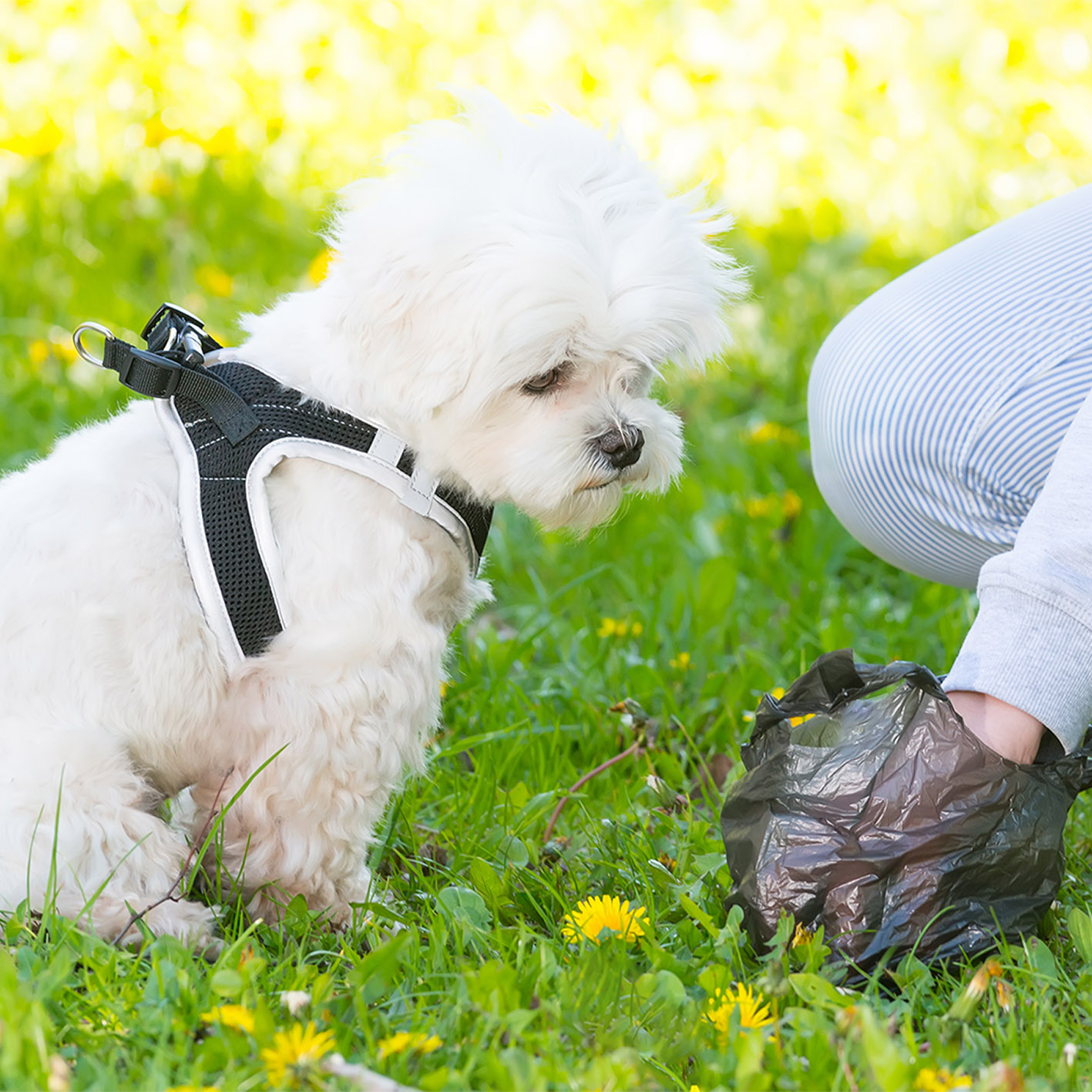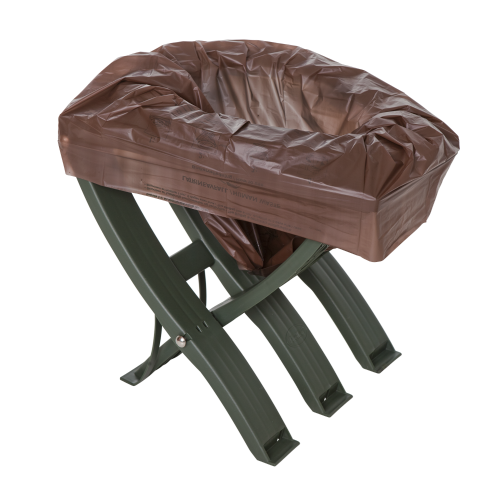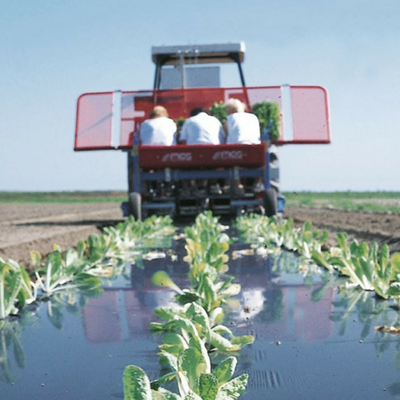
Community composting solutions
Grassroots change makers in communities across Australia are collecting food scraps to rejuvenate soil through composting instead of sending it to landfill. To collect the waste, many people use compostable bags such as BioBag.
 Around 20 percent of councils around Australia offer residents kerbside bins for food organic and garden organic (FOGO) waste, according to the National Waste Report 2018. Yet, greenhouse gases produced by food waste in Australian landfills each year is equivalent to the emissions of Australia’s steel and iron ore industries combined (RMIT University food waste greenhouse gas calculator, 2018).
Around 20 percent of councils around Australia offer residents kerbside bins for food organic and garden organic (FOGO) waste, according to the National Waste Report 2018. Yet, greenhouse gases produced by food waste in Australian landfills each year is equivalent to the emissions of Australia’s steel and iron ore industries combined (RMIT University food waste greenhouse gas calculator, 2018).
There are many ways to keep food scraps out of landfill, even if you don’t have a council FOGO bin or compost bin, says BioBag World Australia Director Scott Morton.
“Grassroots community compost hubs and compost collection services offer solutions for homes and workplaces and we applaud them,” Scott said.
“Each and every one of us can mitigate climate change by reducing the amount of food waste we send to landfill,“ Scott said. “Every small change is meaningful and we encourage everyone to get involved in their local composting programs to return vital nutrients to the soil.”
Community Compost Hubs
Community composting hubs are a fantastic solution for people living in cities without their own gardens or compost bins.
In Brisbane, around 7,000 residents are registered across 25 community composting hubs organised by Brisbane City Council. Deliveries of household food scraps are composted to add nutrients to community gardens. The largest community compost hub in the Brisbane City Council program is the Jane Street Community Garden in West End.
Over 800 local residents and six local cafes usually bring their inedible food waste to the active garden. Established for over 10 years, it covers around 500 square metres and grows nearly 200 different varieties of edible plants including salad greens, vegetables, herbs, fruit and butterfly and insect attracting plants.

Jane Street Community Garden volunteers left to right: Grace O’Connor, Élan Matteo Öberlin, Liz Obersky and James Blyth.
Volunteers usually gather twice a week to add new food scraps and aerate the compost by moving it down a series of open bins as it matures. They also help locals learn about permaculture principles like setting up garden beds, plant propagation, seed saving and companion planting.
Garden Coordinator Melissa Smrecnik says there’s too much compost to use in the gardens so it’s also available to the local community.
“The compost we produce is a beautiful soil conditioner that also goes to local community housing and community initiatives like planting fruit trees in local parks,” Mel said. “It’s also sold back to locals for $5 a bag.”
In Melbourne, Kirsteen Macleod is the co-founder and project manager of The Compost Depot with community drop off points at Thornbury and West Preston in Melbourne’s northern suburbs. It’s a free service that was funded by a Victorian State Government grant. Kirsteen said there’s opportunities for the project to be scaled up with more locations and infrastructure. “We’re dedicated to stopping food scraps from ending up in landfill by offering community compost solutions,” Kirsteen said. “When people drop off their food scraps we’re capturing data so we can track contamination issues, give feedback, and figure out when and how frequently people are coming.”
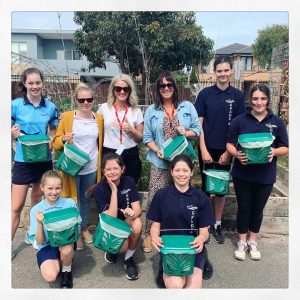
Sustainable You Podcast’s Jacqui and Lisa deliver compost caddies for every classroom at Bonbeach Primary School.
Composting At Schools
Students at Melbourne’s Bonbeach Primary School have BioBag’s vented compost caddies in every classroom to collect nutrients from food scraps for their school’s gardens. The school gardening continues even when classrooms are empty and harvested food is given away to families with no contact pick up or delivery.
“Establishing a worm farm and compost systems in a primary school is a great chance for everyone to be mindful of the waste we produce that can go back to the earth to help build new soil,” says Amy Dowling from the school’s Growing Green Thumbs program. “Such a great effort made by these little super stars who now know to help improve their school’s garden bed soils and decrease their environmental impact.”
Compost Collection Services
As a local solution to transforming organic waste into farm fresh produce in Newcastle, David Sivyer has been operating Feedback Organic Recovery for the past seven years. Collecting from the Hunter’s hospitality outlets meant David had to change his business model in response to COVID-19 by launching the Feedbox program.
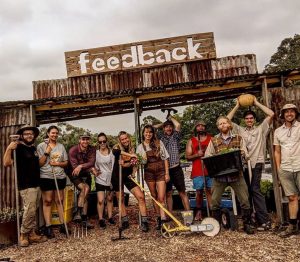 “On Saturday mornings we now harvest our seasonal, organic and sustainably grown vegetables and deliver them to customers on Saturday afternoons,” David said. “We have suspended commercial collection of food waste from restaurants, cafes and hotels in Lake Macquarie and across the Hunter for now. “Feedbox and programs like it are about resilience, because nothing is getting in the way of operations. We are still running our FoodCycle program to collect household food waste and manually convert it into compost at our urban farm in Cardiff Heights.”
“On Saturday mornings we now harvest our seasonal, organic and sustainably grown vegetables and deliver them to customers on Saturday afternoons,” David said. “We have suspended commercial collection of food waste from restaurants, cafes and hotels in Lake Macquarie and across the Hunter for now. “Feedbox and programs like it are about resilience, because nothing is getting in the way of operations. We are still running our FoodCycle program to collect household food waste and manually convert it into compost at our urban farm in Cardiff Heights.”
“Households, apartment blocks and organisations host FoodCycle bins so community members can join those hubs to sustainably manage their food waste in the Newcastle area, as shown on this website map. There’s about 30 bins set up and Feedback’s making FoodCycle available for as many households as possible, as fast as possible! ‘Tentative Host Bins’ are set up when a minimum of 3 budding households are ready to join in the same location. Each FoodCycle location has from 4 to 15 households participating (depending on each situation and how much food waste the households are producing) to change food waste into a food system.”
In Canberra, Brook Clinton runs Capital Scraps Composting as a kerbside collection and composting service that transforms food scraps into soil nutrients. The service also helps to mitigate climate change by keeping organics out of landfills where they create potent greenhouse gas emissions. Brook collects from over 100 households and has continued her scrap bucket collections over the past few weeks, using her scientific knowledge and appreciation for good hygiene to manage the risk associated with the coronavirus.
“The Compost collective and the climate action that it embodies is what drives me,” Brook said. “People have been cooking more at home, creating more food scraps than before and continuing our kerbside collection service is keeping me sane in all this panic and disruption.”
Brook wrote a letter to her customers explaining her experience working with pathogens and assuring them she was taking extra care to sanitise and wear gloves as she cycled around town collecting people’s compost buckets. Brook hopes her business model could grow into a network around Canberra and be replicated to replace other jobs that were not possible at the moment. “The composting and other similar social enterprises could be an opportunity for new job creation for different types of jobs that we haven’t thought about before,” she said.
 In Melbourne, Tyson Dickinson offers a hassle-free food waste recycling and collection service for workplaces aiming for zero waste. Organic Matters Environmental Services offers businesses kitchen bins and signage to encourage separation of food waste from general waste bins. Tyson says food waste is a valuable resource that needs to be returned to the earth to nourish our soil. “Healthier, nutrient rich top soil retains more moisture to grow food and improve resilience to shocks such as drought and other extreme weather events,” Tyson said. “It also reduces the need for chemical inputs such as fertilisers and pesticides.”
In Melbourne, Tyson Dickinson offers a hassle-free food waste recycling and collection service for workplaces aiming for zero waste. Organic Matters Environmental Services offers businesses kitchen bins and signage to encourage separation of food waste from general waste bins. Tyson says food waste is a valuable resource that needs to be returned to the earth to nourish our soil. “Healthier, nutrient rich top soil retains more moisture to grow food and improve resilience to shocks such as drought and other extreme weather events,” Tyson said. “It also reduces the need for chemical inputs such as fertilisers and pesticides.”
“In less than three years of operation, we have diverted 10 tonnes of food waste from landfill. That’s equivalent to 4.6 years of electricity consumption for one household, or 164 tanks of 50 litres of petrol in terms of carbon dioxide emissions.”
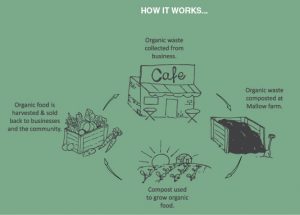 In Brisbane, Mallow Sustainability collects food waste such as coffee grounds, fruit and vegetable scraps and other organic waste including compostable packaging from businesses. Founder Jessica Lindsay composts the organic material to break it down into valuable soil conditioners to grow veggies she sells back to the local community via retailers like Wray Organic. Jessica says the demand exists for food waste collection services and communities needs the logistics and composting technologies to service this demand.
In Brisbane, Mallow Sustainability collects food waste such as coffee grounds, fruit and vegetable scraps and other organic waste including compostable packaging from businesses. Founder Jessica Lindsay composts the organic material to break it down into valuable soil conditioners to grow veggies she sells back to the local community via retailers like Wray Organic. Jessica says the demand exists for food waste collection services and communities needs the logistics and composting technologies to service this demand.
“We use the compost we produce in our farming operations, allowing the nutrients from the organic waste to be returned to the soil rather than being sent to landfill and wasted. This has many benefits to our customers, the environment and the community such as, reducing waste to landfill, reduced costs, combating climate change, improving soil health and supplying local organic food back to the community,” Jessica said.
 In Sydney and Melbourne, Waste Ninja is closing the loop by collecting organic waste from restaurants, cafes and stores like IKEA for composting to grow food for those restaurants and cafes. CEO Darry Pinto says Waste Ninja has diverted 434,500kg of food scraps from landfill. That’s 825,500kg of methane emissions avoided and the equivalent of 65,500 cars removed from the road for one day in carbon dioxide equivalent (CO2e).
In Sydney and Melbourne, Waste Ninja is closing the loop by collecting organic waste from restaurants, cafes and stores like IKEA for composting to grow food for those restaurants and cafes. CEO Darry Pinto says Waste Ninja has diverted 434,500kg of food scraps from landfill. That’s 825,500kg of methane emissions avoided and the equivalent of 65,500 cars removed from the road for one day in carbon dioxide equivalent (CO2e).
In Perth, Kerbside Compost is disrupting the way WA currently manages waste and creating a more sustainable way of managing food waste. Owner Matthew Barbour is an environmental scientist who believes in making a difference: “Kerbside Compost exists to help create a world without waste and to make that process easy. By partnering with us, you are saving your food scraps from entering landfill, reducing your impact on the environment and adding an amazing end product back into your garden.”
Composting Facilities
 The Australian Organics Recycling Association (AORA) has an online Composter Directory where you can search for a composting facility near you. These facilities generally accept organic waste from businesses and waste management companies.
The Australian Organics Recycling Association (AORA) has an online Composter Directory where you can search for a composting facility near you. These facilities generally accept organic waste from businesses and waste management companies.
If there’s no community composting program near you, check out ShareWaste. It’s an app that connects over 50,000 people who want to recycle their kitchen scraps with their neighbours who are already composting, worm-farming or keep chickens.
BioBag is a world leading manufacturer of certified compostable bags and films, now made in Australia with support from the Government of South Australia.
Learn more about how BioBags are made from a compostable resin named Mater-Bi here on our blog.

